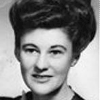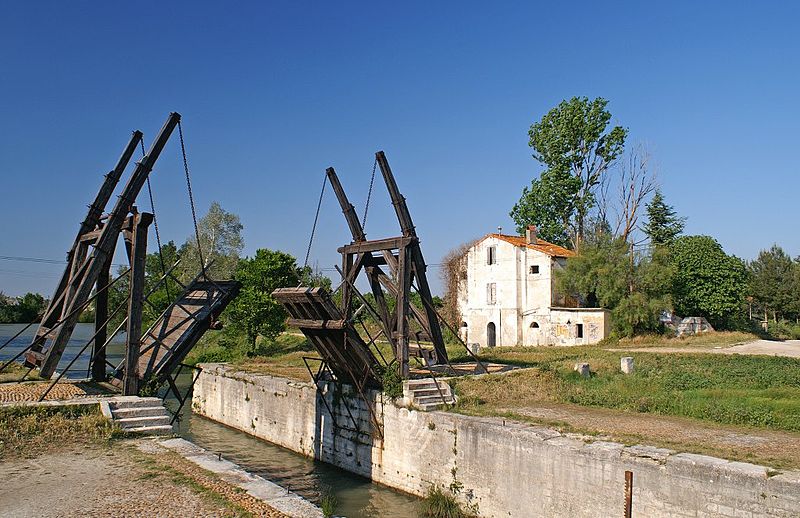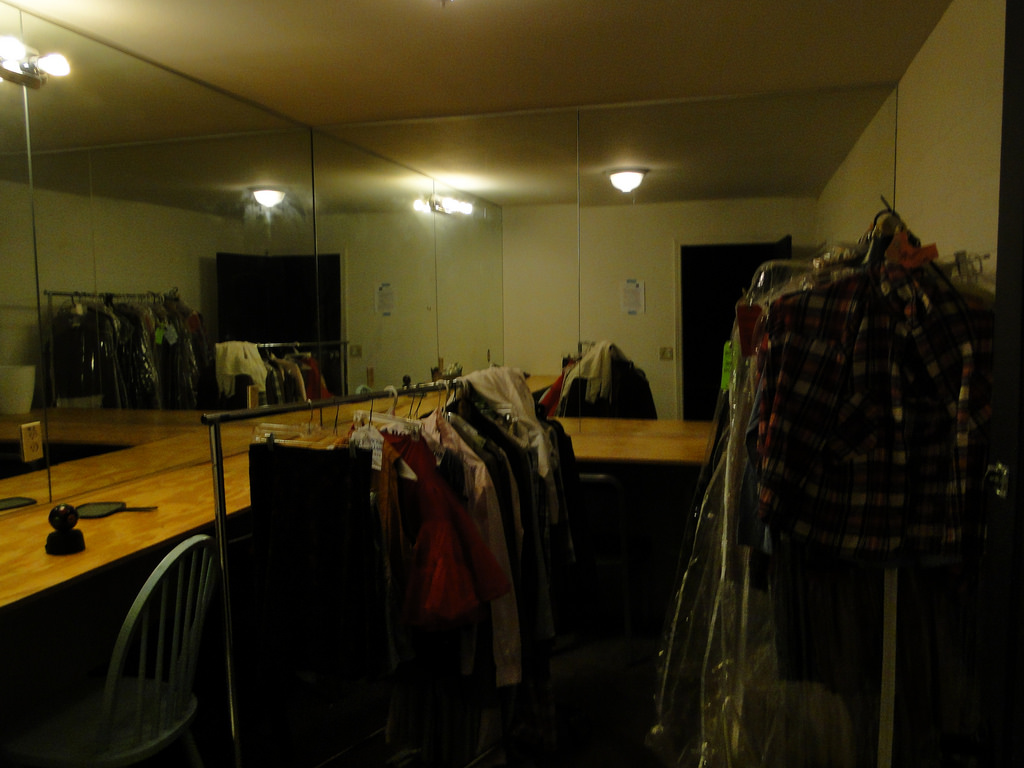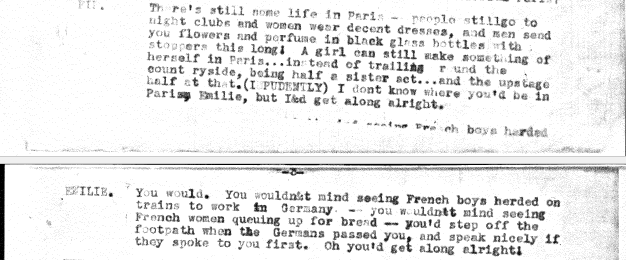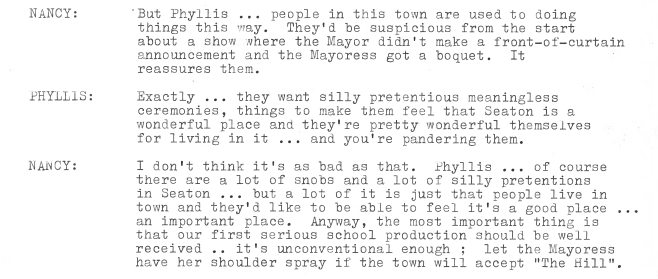AustLit
-
If Leslie Haylen and other proponents of the 'national theatre' are right, then it is from within the spaces occupied in the texts, and on the stage itself, that drama would seek to identify and display this 'soul of Australia'. It might also be where we view a collision of the social spaces of the playwright with the production spaces in which her plays are written, performed, and received; the space that has the capacity to reveal, reinforce, and redress the homeworld even as it occupies its own position within it. In this section I will explore the way the dramatic spaces of Sur Le Pont, Had We But World Enough, and Sky Without Birds engage with the concept of the national identity as homeworld.
-
ANN. He hasn’t been false to France – not the France we want.
LAN. You draw very fine distinctions.
-
Sur Le Pont is set in the backstage wardrobe room of a small-time revue in Arles. It is 1944 in German-occupied France and the night after a bombing of the Arles bridge, which hid a German ammunition dump. The play centres around accusations of collaboration with Nazi and Resistance forces and raises questions about 'the France we want' – with the prescribed answer being one free from fascism. However, while featuring a plot planted firmly in New Theatre principles (the play was written during Gray's period of membership with the CPA), it also demonstrates an awareness of the 'fine distinction' of this chosen national identity and an accompanying sense of caution.
-
There are two main spatial motifs employed in Sur Le Pont: the town of Arles which, in being distinguished by the fact that it is not Paris, presents as a borderzone space; and the wardrobe room, as the liminal space between onstage and the outside world. On the surface level, the use of these spaces fits neatly into the homeworld built around New Theatre policy. It delivers the political struggle into the hands of the ordinary, behind-the-scenes workers, while equating the commercial success of Paris with enemy collaboration. The victory of the actors in the wardrobe room, while both war and show carry on 'off-stage' and unaware, evinces a call to action from the audience, who, though not themselves active at the frontline of the war, are nonetheless portrayed as having a part in the attainment of 'the nation I want'.
-
Such a reading, which might encapsulate very neatly the hero/villain confrontation of the second half of the play, is complicated by the way borderzone and liminal spaces are explored in the first half by an almost entirely separate cast of characters. Here the wardrobe room represents not just backstage to the action, but also a distinctively women's space. The space is filled by theatre gossip, bickering between the wardrobe mistress and the two halves of a sister-act, and musings on betrayal. Emilie the wardrobe mistress, who professes to have occupied this space contentedly for the past thirty seven years, is met with disbelief by the other two women: why not get a job in Paris? But Paris, the cultural and commercial homeworld, is also equated with sell-out to Nazi Germany, which is alien to the homeworld. These conversations evoke a disconnect of the homeworld from the national political identity, and also bring the evil actions of the fascist Lanyon into the same realm as the enterprising actress Fifine.
-
FIF. There's still some life in Paris – people still go to night clubs and women wear decent dresses, and men send you flowers and perfume in black glasses bottles with stoppers this long! A girl can still make something of herself in Paris ... instead of trailing round the countryside, being half a sister set..and the upstage half at that. (IMPUDENTLY) I don't know where you'd be in Paris, Emilie, but I'd get along alright.
EMILIE. You would. You wouldn’t mind seeing French boys herded on trains to work in Germany – you wouldn’t mind seeing French women queuing up for bread – you’d step off the footpath when the Germans passed you, and speak nicely if they spoke to you first. Oh you’d get along alright!
-
The other complicating factor is presented in the figure of Barron, the stage manager who aids in the communication of information to the French forces, and who attempts to shut down any conversation that might be heard onstage – particularly that of a political nature. Barron's insistence on shutting the door, and so limiting transition through the liminal space, functions as an attempt to erase any knowledge of separate space from the onstage/audience homeworld. In the eyes of the homeworld inhabitants, there is only the homeworld, without an alienworld or even a defined borderzone in sight. It is Barron's intent that the wardrobe room not exist to the outside world. For Emilie, meanwhile, backstage is the safe space to talk freely about those things that you cannot 'indulge yourself in public' by speaking of (3), and in this respect is more real and home-like than the outside homeworld.
When Barron's command of space continues into the second half, and he proposes to lock the door after the significant political action has taken place in this liminal space, his unflinching and unyielding behaviour stands starkly against the other two protagonists' (Annette and Durier's) uncertainty. Although their doubt about taking a life is didactically communicated as what makes the protagonists different to 'them' (Nazis), Barron belies this in his overlooking of their uncertainty. He expects that they will immediately exit the liminal space for the stage or the real world, without pause to participate in the very questioning that differentiates 'us' and 'them'. At the same time as the us/them distinction is unsettled, so too is the call to action toward the cause of 'the nation I want'. This all-important liminal, borderzone space in which the fight for a nation's freedom must take place is now locked up and forgotten. After the victory, there is no space for the victors' doubts; no space to question the France they are fighting for and the France that is left to them after the fighting. Thus the use of space in Sur Le Pont poses questions underneath its propaganda: Given that others want another France, given that we have but this liminal space in which to fight for it and then lock the door behind us and move on, can I be sure that 'the France I want' is the right one to be fighting for? How fine is this distinction? And am I denied the space to question it in the homeworld?
-
PHYLLIS: I'm a little different ... that pretty place I was building for myself fell apart because of Lily ... and now I wouldn't be bothered trying to pick up the pieces. I'll take my real world back again, thank you ... it's grim at times, but it's alive — and I find I do not enjoy the company of the moving dead.
-
Had We But World Enough explores a small town's prejudice against Lily, an Aboriginal girl, being cast as Mary the mother of Jesus in the school Easter play. The whole of the action takes place in the lounge room of the home where two of the school teachers, Nancy and Phyllis, board. It is here that the performance is prepared for, threatened, defended; racism justified by the perpetrators and discovered by the victim; the significance of Lily's quasi-suicidal death felt; and relationships made and broken over the responses. Moss identifies the lounge room as a liminal space made for passing through, confirmed in its marginality in an already-peripheral rural town (35-36). The lounge room, like the wardrobe room in Sur Le Pont, is backstage to the 'real' action: the play itself, the workplaces where justice is implemented through education and journalism, the council meetings that execute injustice, the physical bullying of Lily, and her death and discovery. Yet this is the space in which all of these events are felt and where responses are determined. Well beyond the schoolroom, it is the space in which Nancy 'justifies' herself as a teacher (I.i.10), and in which Phyllis, who at first dismisses the significance of small-town politics, comes to the realisation that 'teaching can go further than the ABC' (II.ii.4). It is in the liminality of the lounge room, in between real world events, that Phyllis learns to 'take [her] real world back' (III.i.6).
-
In addition to having a backstage liminality, the lounge room also has a borderzone domesticity. In this domestic space, seemingly 'meaningless ceremonies' surrounding an insignificant school play are acknowledged as pointing to the 'wider world' (I.i.9-10). Phyllis's questioning of Nancy's sense of proportion is upended over the course of the play as she becomes aware of her own narrow vision. The other thing these ceremonies reveal, however, is a set of expectations determined by the inhabitants of the homeworld to which Nancy must conform if she has any hope of presenting her dangerously alien play. These are established to confirm the town of Seaton in its homeworld-ness, as a place worth belonging to. This borderzone space thus enables a view into the boundary-establishing practices of the homeworld, which are examined in their more dangerous capacity as racial prejudice throughout the rest of the play.
-
NANCY: But Phyllis ... people in this town are used to doing things this way. They'd be suspicious from the start about a show where the Mayor didn't make a front-of-curtain announcement and the Mayoress got a bouquet. It reassures them.
PHYLLIS: Exactly ... they want silly pretentious meaningless ceremonies, things to make them feel that Seaton is a wonderful place and they're pretty wonderful themselves for living in it ... and you're pandering them.
NANCY: I don't think it's as bad as that. Phyllis ... of course there are a lot of snobs and a lot of silly pretentions in Seaton ... but a lot of it is just that people live in town and they'd like to be able to feel it's a good place ... an important place. Anyway, the most important thing is that our first serious school production should be well received ... it's unconventional enough; let the Mayoress have her shoulder spray if the town will accept 'The Hill'.
-
These revelatory qualities acknowledged, the lounge room borderzone is more than an onlooker's vantage point into racial prejudice – it is also a space from which the war is fought. The antagonist Whalen enters into it as representative of the homeworld's attempt to eject the alien from its midst, but by his own alien presence is forced to give over some level of his power to the women for whom this borderzone is home. This is confirmed by the principal's decision to hand all authority concerning the play over to Nancy, as her rightful realm. In this space, moreover, Nancy and Phyllis have the authority to bring Lily into their home and pronounce the alien ally. The space is thus comparable to the distant grounds of the war, in which Nick notes that ally fought alongside ally without thought for race.
-
While the lounge room works to negotiate a social world from within the domestic, it is through the symbolic space of the bridge on which Lily meets her death that these social issues are fully framed within the question of national identity. The bridge is a liminal space between the higher and lower socioeconomic areas of Seaton, its need for repair allowed to go ignored because it led to the 'wrong side of town' (II.iii.1). Whalen's attempt to rationalise this decision as an 'endeavour to save the taxpayers money' points to a particular identity that he and those he represents are committed to serve at the exclusion of others (II.iii.4). The bridge thus functions as a borderzone between the homeworld, containing those who conform to this identity, and the alienworld. Gray, leaving the problem meaningfully unresolved, suggests that the bridge will never be properly repaired so long as the need for a clearly defined homeworld weighs in heaviest.
-
CHALMERS: As for fundamental soundness of the bridge ... so many things that appear fundamentally sound are rotten under our feet.
NICK: So sweep 'em away, John. But the bridge won't be swept away. It'll be patched up, and kept in use. But someday ...
CHALMERS: An allegory, Nick?
WHALEN: I'm not overlooking the mistake, but a council has to endeavour to save the taxpayers money ...
-
The main criticism Had We But World Enough has received is that Lily's death is too easy a solution that simply clears the way for drawn-out analysis of each character's emotional response (Marguerite I. Birch 122, Leslie Rees 126). Pertinent as her perspective is, Gray is nonetheless a playwright of her time, and Moss argues that this comes through most clearly in the change of emphasis in the final act which 'allows the story of the dominant culture to take precedence' (85). Perhaps, after all, this is the inevitable consequence of inhabiting the lounge room space. In this space, the struggles and concerns of those for whom it is homeworld will always demand foregrounding, regardless of the best intentions of characters and even playwright. And so once again, the homeworld weighs in heaviest.
-
In his 1952 review of Sky Without Birds, Leslie Rees writes that 'once again one notes and appreciates Oriel Gray's direct feeling for the dispossessed' (93). The review in the Tribune, meanwhile, is glowing in its praise of her depiction of 'much of the Australian tradition', to which is credited the return of the dispossessed's 'faith in humanity'. These two reviews exemplify the tension Sky Without Birds straddles: the tension of national solidarity and international concern foregrounded when a stranger seeks refuge in a foreign community.
Again the setting of the play is liminal. Koorora, a settlement of 67 people, exists only as a stop along the railway through the Nullarbor Plain – a place at which to pause and move on: 'it's not a town, it's not ... anything ... It's not even a point of arrival and departure, because no one stays here long enough for that' (III.i). All the action takes place in the town post office, through which residents attempt to make contact with civilisation through post and a faulty switchboard. This, the most extreme borderzone of any of her plays, is the space into which Gray chooses to introduce the ultimate stranger of the time: a German refugee in the aftermath of World War II. To an even greater extent than the lounge room of Had We But World Enough, the post office is where events are communicated rather than where they actually occur, whether as town gossip or government correspondence. It is thus the centre of relational events, and gives opportunity for plot and characters to be extrapolated outwards into greater society. Indeed, this opportunity is expressed as precisely the hope of the refugee, Heinrich, in the final scene: 'All the problems – big and small, I think – all the problems have to start to be solved in desert post offices, in kitchens, in back bars.' (III.ii)
-
The isolated nature of Koorora, with its impassable borders of empty space through which no birds fly, allows it to operate as a very tightly defined homeworld. The atmosphere of suspicion in a homeworld very aware of its borders and its disconnect from what lies outside of them might be compared to that surrounding the Youth Carnival at which Sky Without Birds premiered, as discussed above in the section on Production Spaces. The heightened sense of nationhood post-wars is coupled with an awareness of international concerns, and these come together in both the Youth Carnival and Sky Without Birds as an unavoidable clash. In this play the point of tension is expressed through an affair between the stranger, Heinrich, and Nereia, the young wife of locomotive engineer Rick. The two male characters who enter into the disturbance caused by Heinrich and Nereia's affair, Major and Bartley, are more concerned by Nereia's association with the stranger than by the crime of adultery itself, since it is that facet which presents the greatest disturbance to the homeworld status quo. The tension comes to a head with a near-brawl in the final scene of act two, during which each character in turn is entreated by Major, the postmaster, to leave, in various efforts to ease the friction. But no one does, and the inadequacy of his conciliatory efforts is most obvious in the fact that in a town like Koorora there is nowhere to go to escape it. The scene is only resolved when Rick, whom Moss describes as Gray's 'new man' of tolerance (91), enters the post office and retrieves Heinrich himself in a gesture of gracious solidarity. Thus, in a borderzone so extreme there are no further edges to which a stranger can be pushed, Gray reconfigures the Australian tradition around a stalwart Australian of rough jokes, few words and generous actions, who is sure enough of his homeworld to risk his place in it for the stranger. Rick, and others like him, bring to fruition the possibility expressed earlier in the play by Major's wife Peg:
-
NEREIA: Do we have to have labels? Do we have to be divided into camps?
PEG GETS OUT ANOTHER BATCH OF FORMS AND PUTS THEM INTO HOLDER.
PEG: Keep your hands off this lot! (SERIOUSLY) No — we haven't got to be divided into camps ... in fact we shouldn't be, mostly. But there are essential things to want ... and some people find it more profitable for them if those things are withheld. Oh, I can't explain it very clearly, Neri — it's more something I feel than something I can put into words. But I know that people from different countries and different governments can be togethor on this, just as people from the same countries can be opposed.
-
The concluding act, however, casts the shadow of realism over the promise of this ideal. Major, the war veteran entrenched in his prejudices, comes close to repenting of his attitude to Heinrich before he is diverted by a long hoped-for call from Perth. A growing awareness of his own dissatisfaction as a dweller of liminal space, and how he has tried and failed to assert his significance by upholding 'responsibilities' to the homeworld, is diverted (III.i): instead, the homeworld, symbolised by the governing authorities of Perth, buffers his self-assurance with a call back to familiar duties. Major thus clings too tightly to his connection with the homeworld and goes unchanged. Finally, the ideal is unrealised because the stranger does eventually leave. Heinrich moves on from Koorora, and though he and Nereia have grown into 'better selves' (III.ii), he leaves a question behind him: even in the best of circumstances, is the stranger fated to perpetual liminality?
You might be interested in...

